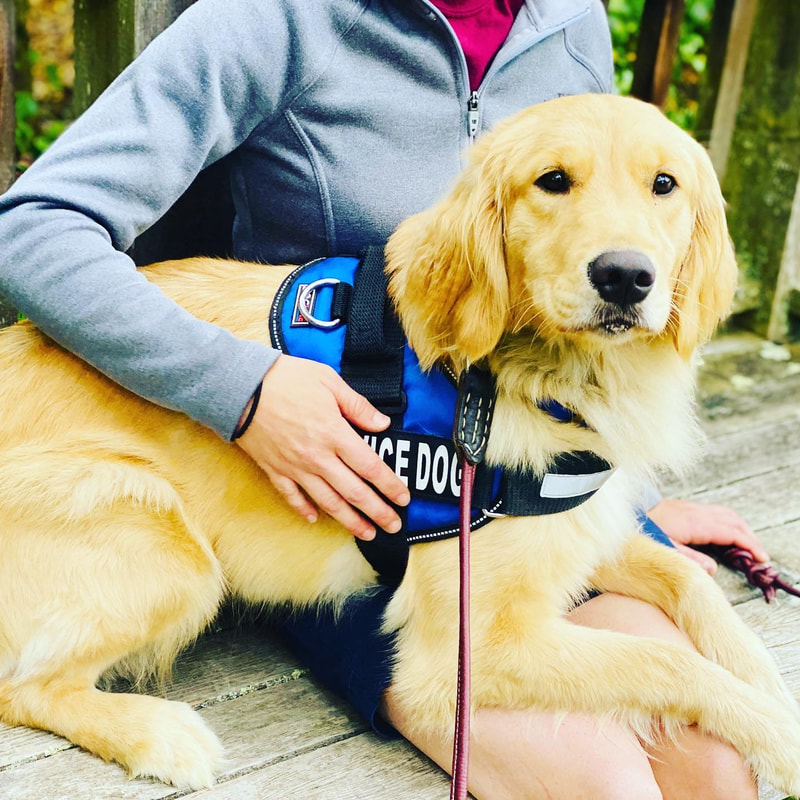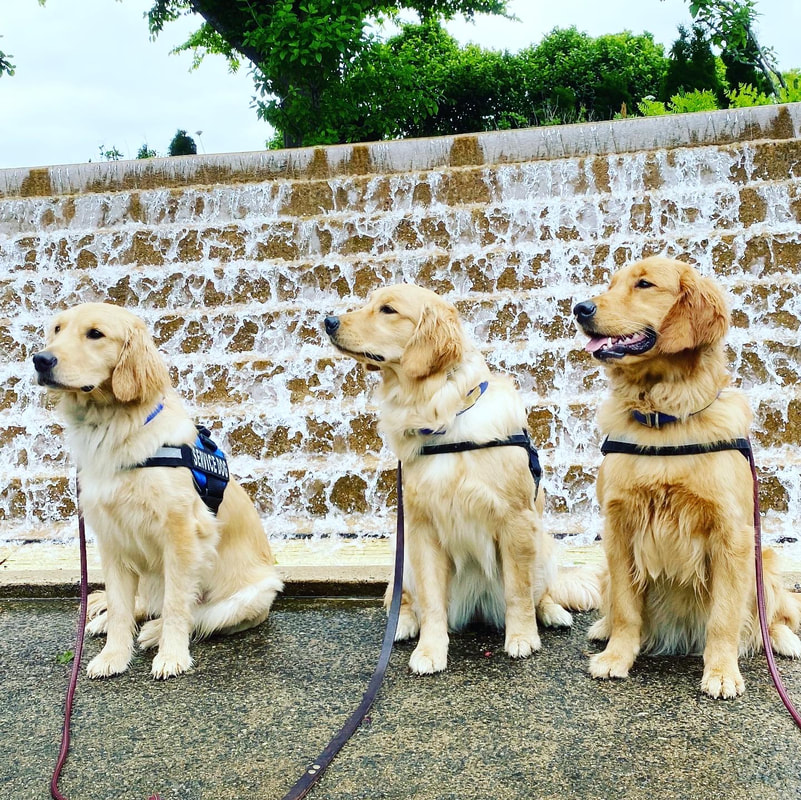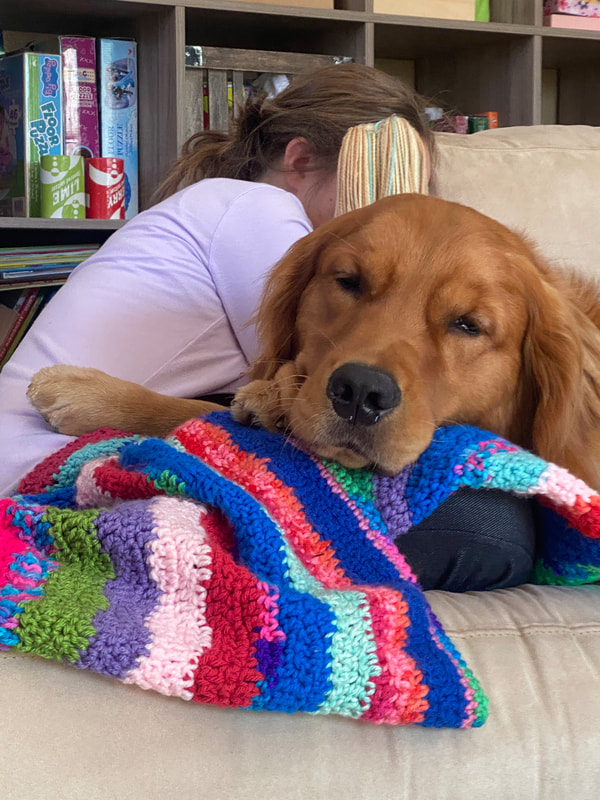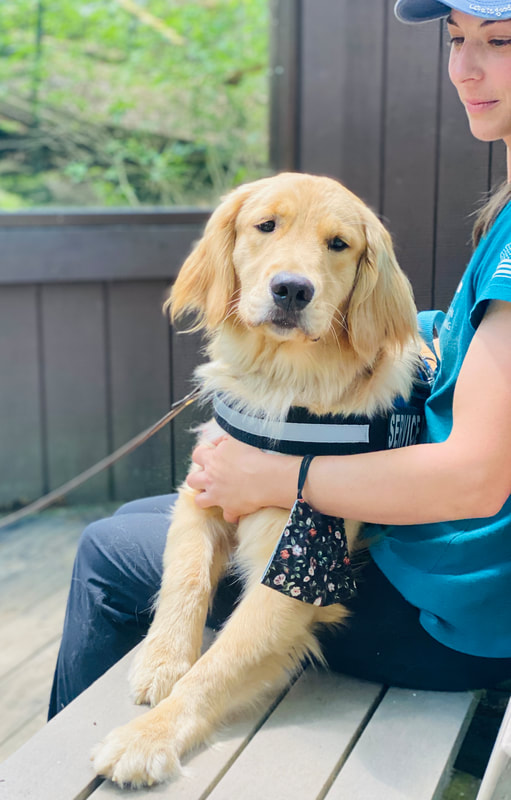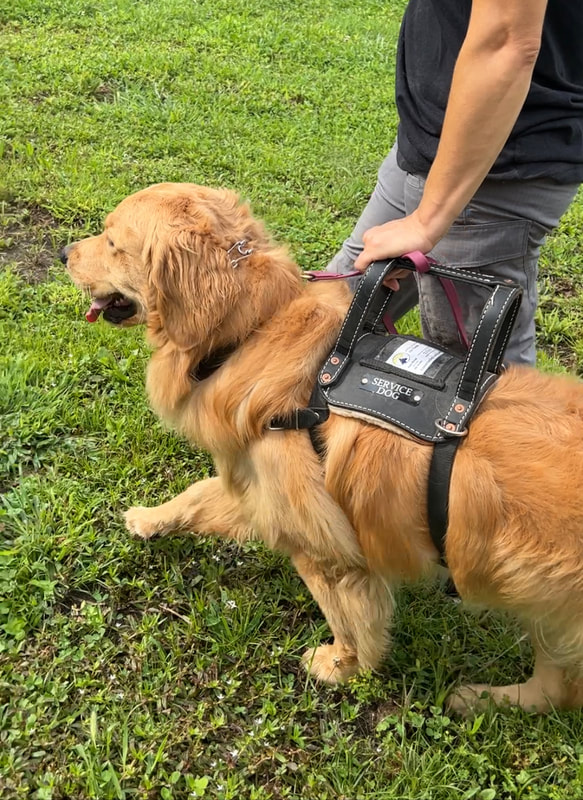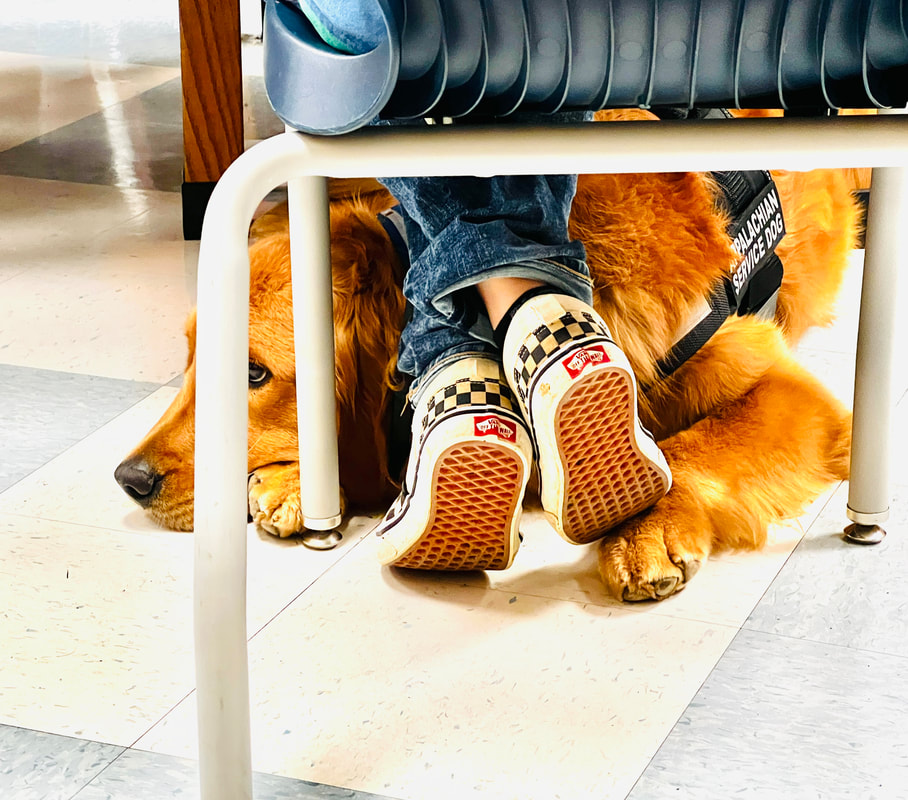Service Dog Training Program
|
The rules and roles differ for service dogs, therapy dogs, and emotional support animals (ESA). Each type of dog has a different skill set, temperament, and rights or limitations to access public spaces.
Service dogs are trained to perform a task or tasks for an individual to help mitigate their disability. Service dogs accompany their handler in public where pets are not permitted. Therapy dogs are trained to give comfort to persons they visit. Therapy dogs are invited into facilities for therapy for therapy dog visits. Reading groups, family courts, nursing homes, and hospitals are typical visits for a trained therapy dog. Emotional Support Animals (ESA's) do not require training and may be permitted to live in housing where pets are not permitted. An ESA can be any animal that you feel provides comfort in your home. ESA's are not permitted on airline flights or in public spaces. |
Service Dogs of Excellence
We select, breed, and raise golden retriever puppies exclusively for our service dog program. The golden retriever is outgoing, devoted and affectionate, fostering exceptional partnerships with their handlers. We have been developing our line of golden retrievers for health, temperament and conformation to build a better working dog.
Breeding our best service dogs allows us to capture, preserve and advance health, temperament and conformation traits. Each of our breeding dogs completes two years of training for Therapy Dog and Service Dog in addition to Puppy Head Start, On Leash, Off Leash, and public access training. Breeding dogs must also meet our rigorous health and conformation standards.
Owner, Katie Weibel, graduated from university that specialized in breeding service dogs for over 40 years. The university's research is applied to our screening and selecting breeding stock, whelping practices, and early handling protocols giving our puppies a monumental advantage to succeed in health, temperament and trainability.
A service dog is a financial and emotional investment and we guarantee a sound, working service dog for our clients. We do not accept existing pets into our program as health, temperament, and trainability are traits that cannot be overlooked.
Approved service dog applicants will be matched with a service dog based on application requirements, medical recommendations, task(s) required, and lifestyle. You will meet with our service dog trainers and approve of the service dog selected for you. Training will then be completed, and the dog delivered to your home over several days of training.
Breeding our best service dogs allows us to capture, preserve and advance health, temperament and conformation traits. Each of our breeding dogs completes two years of training for Therapy Dog and Service Dog in addition to Puppy Head Start, On Leash, Off Leash, and public access training. Breeding dogs must also meet our rigorous health and conformation standards.
Owner, Katie Weibel, graduated from university that specialized in breeding service dogs for over 40 years. The university's research is applied to our screening and selecting breeding stock, whelping practices, and early handling protocols giving our puppies a monumental advantage to succeed in health, temperament and trainability.
A service dog is a financial and emotional investment and we guarantee a sound, working service dog for our clients. We do not accept existing pets into our program as health, temperament, and trainability are traits that cannot be overlooked.
Approved service dog applicants will be matched with a service dog based on application requirements, medical recommendations, task(s) required, and lifestyle. You will meet with our service dog trainers and approve of the service dog selected for you. Training will then be completed, and the dog delivered to your home over several days of training.
Application ProcessDetermine if your disability needs meet our program requirements for a service dog by completing our free Service Dog Online Application.
Your application will be reviewed to evaluate your type of disability, symptoms, severities, and lifestyle. Our service dog trainer will be evaluating the potential benefit of a service dog based on your needs and the program requirements. If approved, an additional application will be mailed to you. Once all applications are approved and medical references received, a service dog will be selected for you. Please allow up to 4 weeks for notification of application approval. We understand their is a great, unmet need for reliable, trained service dogs. We hope to assist to you and encourage you to apply. |
Types of Service Dogs
Autism AssistanceAutism Assistance service dogs and child Assistance service dogs work for the parent or guardian to help mitigate their child's disability. The parent/guardian is fully responsible for all the care, handling, and facilitating of the service dog. Children who are not of mature age and capacity cannot facilitate their own service dog at school and are not able to take the dog to school.
These service dogs provide support to the parent/guardian through tasks tailored to the child's needs. The dog can interrupt stemming behaviors, provide deep pressure therapy, track a child that has eloped, and serve as a tether or lead for the child when out in public. A service dog helps provide focus for the child by giving them a job to do. The child is encouraged to use their special lead to "walk" the service dog, while the parent/guardian is actually in control of the service dog and commanding the service dog to perform the tasks. Many parents find the service dog to help their child fall asleep faster stay asleep longer. While sleeping with their child is not a "task", allowing the parents to sleep through the night is an enormous victory. Service dogs provide a calming presence. They are affectionate and love to perform their tasks. |
Adult Autism AssistanceTeens and adults can experience a greater sense of independence with a highly trained service dog. Service dogs that can be controlled properly and effectively by their handler can accompany them at school or in the workplace.
It is in these most challenging environments, school and work, that a service dog is most helpful. They provide a calming presence and sense of security. Service dogs are trained in all public access in addition to the special requirements of working in a public school or busy work environment. Tasks may include touch and lay. The dog may also be trained to sleep soundly overnight, providing that continuing comfort for sleeping through the night. Autism/Adult assistance may include additional tasks to best help their handler. Our application process helps us to learn which tasks would be most beneficial. |
Mobility and StabilityMobility service dogs assist individuals who currently utilize a manual or power wheelchair. The dogs assist their handler in various ways such as opening doors, retrieving dropped items, and turning on lights. They do not pull the wheelchair. They help their handler to navigate this very inaccessible world by reaching things high and low.
Stability service dogs are of considerable size to provide the strength needed to help their handler sit down and stand up. They also provide a strong guide when walking up and down stairs. Many stability dog handlers utilize a wheelchair and/or roller walker. These service dogs also retrieve dropped items, open doors, and turn lights on. |
PTSDA service dog performs customized tasks to help bring a sense of safety, security, self-awareness and companionship to affected individuals, military and civilian.
PTSD/ Psychiatric service dogs can enter the house in front of their handler and turn on a light, activate a K-9 Rescue Alarm to call for help, and stand away from their handler to increase their 'space bubble'. The service dog may be trained to retrieve a medication bag, provide stability task assistance when medication causes imbalance, or respond to the alarm clock by licking or nudging the handler awake. The service dog may be trained to provide an interruption when emotional overload or disassociation occurs. Deep pressure therapy can be provided by the service dog lying on your lap or chest during times of stress. |
The applications of a PTSD/ Psychiatric service dog are many; this is not an exhaustive list. PTSD service dogs are never trained to bark at, act aggressive towards, or used in any way to help 'protect' their handler. PTSD service dogs are friendly, highly social dogs suitable for public access that encourage the handler to become engaged with those around him or her.
Service Dog Delivery
Service dog costs include the dog, training, care, veterinary services, and equipment. Fees range from $20-30,000 and are based on the type of service dog and tasks required. Payment terms are offered in 6 months or 12 months and will allow time for fundraising to help cover the costs of your service dog. Costs and payment terms are identified in our Training Agreement.
Once your service dog is fully trained, he or she will be delivered to you. Delivery is conducted in your home from morning until evening over the course of several days. You must be home and schedule all appointments and activities you regularly attend such as therapy sessions, grocery shopping, dining out, and religious services. Costs you must pay include the final payment, our travel to your home, lodging, and meals.
Once your service dog is fully trained, he or she will be delivered to you. Delivery is conducted in your home from morning until evening over the course of several days. You must be home and schedule all appointments and activities you regularly attend such as therapy sessions, grocery shopping, dining out, and religious services. Costs you must pay include the final payment, our travel to your home, lodging, and meals.
Service Dog FAQ's
Q: What breeds are service dogs?
A: Service dogs can be any breed, however, we select the most human-cooperative breeds for service dogs. Service dogs must have the desire to please and work for people. These breeds are Golden Retrievers, Labrador Retrievers, Poodles, Doodles, and Shepherds.
Q: Can I adopt a service dog?
A: Service dogs are trained specifically for you. Because the training is tailored to you, there is not one for adoption. Service dogs require one to two years of training. After application approval, you are matched with a service dog for your needs, then highly specialized training begins.
Q: How expensive are service dogs?
A: Service dogs start training at eight weeks old. They have extensive testing and perfect temperaments for the job, upwards of $3000+. However, the puppy is still the cheapest part of training a dog to become a service dog. Training, lasting 18 months on average, accounts for most of the costs of a service dog. The national average cost of a service dog ranges from $25,000 to $50,000. We strive to keep costs well below the national average to help make service dogs more accessible to those who need them most.
Q: Is there funding or grants for service dogs?
A: Some local and federal agencies may be able to provide you with funding towards your service dog. This usually involves contacting local agencies (such as your local Family Center) and requesting assistance.
Q: Service dogs are expensive; how can my family afford one?
A: Many families do not have the funds ready to pay for a service dog. Several options to help with this challenge are split payments and fundraising. We do not require that you pay the entire costs all at once.
Q: Is fundraising available?
A: Fundraising is an excellent way to offset costs for your service dog. While we do not organize your fundraising events, we often join them! Options are virtually unlimited. A few ideas are: a dog wash, car wash, spaghetti dinner, sidewalk sale, a walk-a-thon, just to name a few!
A go-fund me page with updates is another excellent way to reach many people without even leaving your home. We provide periodic updates for you to post about your service dog’s training journey. You also get to share the daily and weekly training pictures we post on Facebook and Instagram for everyone to follow.
Use your talents and contacts (sewing, mechanical expertise, gardening, friend’s business etc.) to think of creative ways to share an enjoyable experience, service, product or gift in exchange for a donation. Many clients raise funds well over the costs and well before delivery day. You will be pleasantly surprised with the support from your community.
Q: How do I apply for a Service Dog?
A: Applications can be completed online, or you can request one to be mailed to you. We will review your application to better understand your needs and how a service dog may best mitigate your most significant symptoms.
Q: What is the process for getting a service dog if my application is approved?
A: We select a dog for you and invite you to the Training Center to meet your dog. If the match between you and your service dog is approved, we enter into a training contract and begin training your service dog. You are encouraged to visit your service dog periodically while he is in training over the next 1-2 years. At completion of training, your service dog will be delivered to you with a in-home training to ensure you master all of your service dog’s care, handling, and training.
Q: Does my service dog have a guarantee?
A: Yes, we have a detailed health guarantee for our service dogs which takes effect when your dog is delivered to ensure your dog’s health and your investment. We do not health guarantee a service dog when you purchase your own puppy/dog to be trained. We also provide support training for life, for both you and your service dog. In addition, we require that your service dog attend refresher training in the first year to ensure his training is maintained and no task changes are needed. We support our working service dog teams for life!
A: Service dogs can be any breed, however, we select the most human-cooperative breeds for service dogs. Service dogs must have the desire to please and work for people. These breeds are Golden Retrievers, Labrador Retrievers, Poodles, Doodles, and Shepherds.
Q: Can I adopt a service dog?
A: Service dogs are trained specifically for you. Because the training is tailored to you, there is not one for adoption. Service dogs require one to two years of training. After application approval, you are matched with a service dog for your needs, then highly specialized training begins.
Q: How expensive are service dogs?
A: Service dogs start training at eight weeks old. They have extensive testing and perfect temperaments for the job, upwards of $3000+. However, the puppy is still the cheapest part of training a dog to become a service dog. Training, lasting 18 months on average, accounts for most of the costs of a service dog. The national average cost of a service dog ranges from $25,000 to $50,000. We strive to keep costs well below the national average to help make service dogs more accessible to those who need them most.
Q: Is there funding or grants for service dogs?
A: Some local and federal agencies may be able to provide you with funding towards your service dog. This usually involves contacting local agencies (such as your local Family Center) and requesting assistance.
Q: Service dogs are expensive; how can my family afford one?
A: Many families do not have the funds ready to pay for a service dog. Several options to help with this challenge are split payments and fundraising. We do not require that you pay the entire costs all at once.
Q: Is fundraising available?
A: Fundraising is an excellent way to offset costs for your service dog. While we do not organize your fundraising events, we often join them! Options are virtually unlimited. A few ideas are: a dog wash, car wash, spaghetti dinner, sidewalk sale, a walk-a-thon, just to name a few!
A go-fund me page with updates is another excellent way to reach many people without even leaving your home. We provide periodic updates for you to post about your service dog’s training journey. You also get to share the daily and weekly training pictures we post on Facebook and Instagram for everyone to follow.
Use your talents and contacts (sewing, mechanical expertise, gardening, friend’s business etc.) to think of creative ways to share an enjoyable experience, service, product or gift in exchange for a donation. Many clients raise funds well over the costs and well before delivery day. You will be pleasantly surprised with the support from your community.
Q: How do I apply for a Service Dog?
A: Applications can be completed online, or you can request one to be mailed to you. We will review your application to better understand your needs and how a service dog may best mitigate your most significant symptoms.
Q: What is the process for getting a service dog if my application is approved?
A: We select a dog for you and invite you to the Training Center to meet your dog. If the match between you and your service dog is approved, we enter into a training contract and begin training your service dog. You are encouraged to visit your service dog periodically while he is in training over the next 1-2 years. At completion of training, your service dog will be delivered to you with a in-home training to ensure you master all of your service dog’s care, handling, and training.
Q: Does my service dog have a guarantee?
A: Yes, we have a detailed health guarantee for our service dogs which takes effect when your dog is delivered to ensure your dog’s health and your investment. We do not health guarantee a service dog when you purchase your own puppy/dog to be trained. We also provide support training for life, for both you and your service dog. In addition, we require that your service dog attend refresher training in the first year to ensure his training is maintained and no task changes are needed. We support our working service dog teams for life!
Owner Trained/Self Trained Service Dogs
Our Service Dog Program guarantees a healthy, sound service dog ready to work upon delivery. With the natural variables in breeding, health, temperament and clients' individual lifestyles we cannot guarantee a working service dog when we are not involved in the entire process, from puppy breeding to delivery training.
We breed and raise our service dog candidates under a strict protocol to ensure working capacity and health and do not accept existing dogs into our program. We strictly utilize our Golden Retrievers to become your service dog. Our line of Golden Retrievers have proven, working offspring to demonstrate the genetics of sound temperament, biddable working drive, and health to serve as an effective partner. Many breeders will suggest their dogs make great service/therapy dogs but fail to provide proof of real working teams. Temperament is a result of nature and nurture.
Consideration may be granted to acquire a puppy from a service dog breeder provided the puppy meets our health requirements and our trainers can select the puppy. In this event, your puppy will enter into our program at 8 weeks age and will not live at home with you. There is no discount for providing your own puppy and they may be washed from our program, necessitating replacement with a suitable candidate extending the time and increasing the costs of receiving your service dog.
Owner-trained program are lucrative. They make it seem quick, cheap and easy to turn your dog into a service dog with just a few classes and minimal fees. These programs detract from real service dogs and focus on the company's objectives, not your success as a working service dog team.
We will not waver in our commitment to you. An applicant that truly needs a service dog deserves the opportunity to gain independence and freedom. We want to be a part of your success story!
We breed and raise our service dog candidates under a strict protocol to ensure working capacity and health and do not accept existing dogs into our program. We strictly utilize our Golden Retrievers to become your service dog. Our line of Golden Retrievers have proven, working offspring to demonstrate the genetics of sound temperament, biddable working drive, and health to serve as an effective partner. Many breeders will suggest their dogs make great service/therapy dogs but fail to provide proof of real working teams. Temperament is a result of nature and nurture.
Consideration may be granted to acquire a puppy from a service dog breeder provided the puppy meets our health requirements and our trainers can select the puppy. In this event, your puppy will enter into our program at 8 weeks age and will not live at home with you. There is no discount for providing your own puppy and they may be washed from our program, necessitating replacement with a suitable candidate extending the time and increasing the costs of receiving your service dog.
Owner-trained program are lucrative. They make it seem quick, cheap and easy to turn your dog into a service dog with just a few classes and minimal fees. These programs detract from real service dogs and focus on the company's objectives, not your success as a working service dog team.
We will not waver in our commitment to you. An applicant that truly needs a service dog deserves the opportunity to gain independence and freedom. We want to be a part of your success story!
Address (by appointment):
|
Phone/Text |
|

